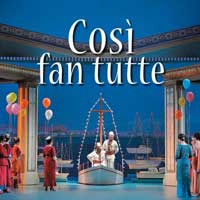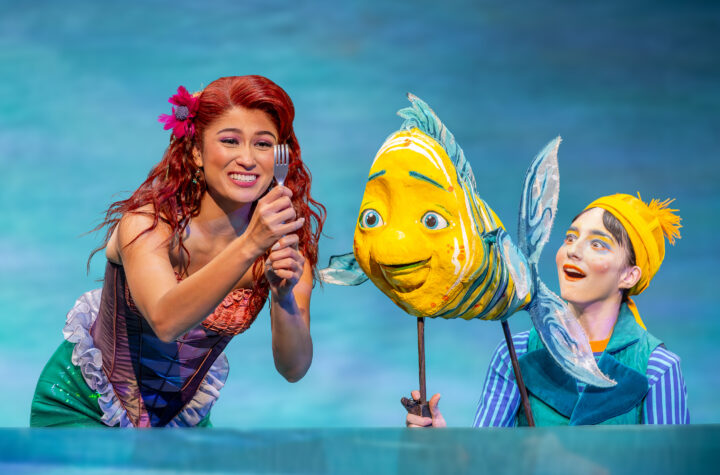
Sublime music mismatched with fluffy subject matter—that’s the long-standing criticism of Wolfgang Amadeus Mozart’s late comic operas, and of Così fan tutte, especially. John Cox, the original director of the production now at the Lyric Opera, must have been determined for that not to be the case in his version, because the tone shifts between romantic comedy and drama so seamlessly almost everything feels organic to the work. Which is not to say that it’s unfunny; in fact, the revival, directed by Bruno Ravella and conducted by Lyric-newcomer James Gaffigan, is hilarious. Everything looks and sounds beautiful, but there is a sense something is at stake, and thanks to a shift in location, the show takes its characters’ hurt and uncertain futures too seriously to be pure escapism.
Although there is a chorus, the play, with a script by Lorenzo Da Ponte, is tightly focused on just six characters. Guglielmo (Joshua Hopkins) and Ferrando (Andrew Stenson) are soldiers engaged to be married to the sisters Fiordiligi (Ana María Martínez) and Dorabella (Marianne Crebessa), respectively. An old man, Don Alfonso (Alessandro Corbelli), mocks the men for believing women are capable of devotion, and they bet him that their fiancés will stay true even if put to the test. Don Alfonso enlists the women’s maid, Despina (Elena Tsallagova), who believes the women are likewise foolish for trusting the men and wants to prove it to them. They tell the sisters that their lovers have been sent away to war, and the men, each disguised as an Albanian sailor, attempt to seduce each other’s fiancés. At first, they are unsuccessful and are glad for it. But through a laughably transparent hoax and not much effort otherwise, first Dorabella, and then Fiordiligi succumb enough for the men to consider them unfaithful.
Cox has moved the play’s time and place to a Monte Carlo-like resort at the outbreak of World War I. The cleverness of this is that even the people who behaved as if the war would be a great trial really believed that it was just an opportunity to posture, but we, the audience know better. The concept is vindicated even in the overture, which starts off lulling but then takes a sudden turn toward the dark and dramatic. When Don Alfonso tells the women that their lovers have been sent to the front, he uses an actual newspaper as evidence. This makes their trio “Soave sia il vento” a lovely, melodious farewell but also an incredibly cruel joke. On the other hand, that Fiordiligi and Dorabella are performing in-universe during their initial lamentations allows them to be much more over-the-top, to great comedic effect, while also establishing a clear contrast with their later, more sincere confusion and longing.
All six singing actors are masters of both crafts. Martínez has two stand-out moments. In her early aria “Como scoglio,” she stands centerstage and her vibrato sounds like the echoes in a fortress as she declares she will not succumb to the advances of the “Albanians.” But in her later aria “Per pietà, ben mio, perdona,” her vibrato communicates uncertainty and her body language is much more naturalistic. During tenor Stenson’s aria “Un’aura amorosa,” in which he rejoices in Dorabella’s initial steadfastness, conductor Gaffigan makes the violins swell romantically beneath him as he sighs. After the bonds between the lovers are broken, Hopkins rebukes women with the patter-like “Donne mie, la fate a tanti,” but his pompousness makes him more the butt of the joke than they are. When Dorabella admits to her sister that she has changed affections with her aria “È amore un ladroncello,” Crebassa employs so much adolescent excitement that the audience finds it easy to take her side.
But as excellent as all the arias are, a Mozart opera is interminable if the recitatives are uninspired. Thankfully, that’s not the case here. Each actor uses their dialogue to explore some nuance of their relationships with the other characters. Despina shames her mistresses under a guise of teasing them for not exercising their feminine wiles, and she provides a counterexample at each opportunity. This makes it all the more vindicating when Fiordiligi and Dorabella find small opportunities to one-up her. Tsallagova, as Despina, is making her U.S. debut, and she is responsible for a lot of the play’s funniest moments, especially when she imitates a boy soprano’s voice while disguised as a man. Corbelli’s Don Alfonso is a folkloric devil skulking in the shadows of the sumptuous sets designed by Robert Perdziola. This is a production that fully explores the dramatic possibilities of the script, and the funny parts are all the more enjoyable because of it. There are farcical elements, especially when the guys are in their Albanian garb. But by the end, the bigotry of the phrase Così fan tutte, “Women are all like that,” rather than being apologized for as an anachronism irrelevant to the music, has been thoroughly interrogated.
Così fan tutte will continue at the Civic Opera House, 20 N Upper Wacker Drive, Chicago, thru March 16, with the following showtimes:
February 21: 7:30 pm
February 26: 7:30 pm
March 4: 2:00 pm
March 8: 2:00 pm
March 13: 7:30 pm
March 16: 7:30 pm
Running time is three hours and thirty-five minutes with one intermission.
The Lyric offers parking deals with Poetry Garage at 201 W Madison St. if inquired about in advance. Tickets are $17-319; to order, visit LyricOpera.org or call 321-827-5600.
To see what others are saying, visit www.theatreinchicago.com, go to Review Round-Up and click at “Cosi fan tutte.”







More Stories
“Disney’s The Little Mermaid”
“A Beautiful Noise : the Neil Diamond Musical”
“Annie”